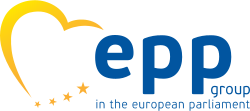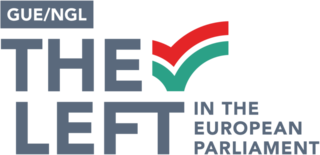
The Left in the European Parliament – GUE/NGL is a political group of the European Parliament established in 1995, and is composed of left-wing and far-left members. Before January 2021, it was named the European United Left/Nordic Green Left.

Union for Europe of the Nations (UEN) was a national–conservative, Eurosceptic political group of the European Parliament active between 1999 and 2009.

Fidesz – Hungarian Civic Alliance is a right-wing populist and national-conservative political party in Hungary.

The European People's Party is a European political party with Christian-democratic, conservative, and liberal-conservative member parties. A transnational organisation, it is composed of other political parties. Founded by primarily Christian-democratic parties in 1976, it has since broadened its membership to include liberal-conservative parties and parties with other centre-right political perspectives. On 20 November 2019, the party elected as its president the former Prime Minister of Poland and President of the European Council, Donald Tusk.

The President of the European Parliament presides over the debates and activities of the European Parliament. They also represent the Parliament within the EU and internationally. The president's signature is required for enacting most EU laws and the EU budget.

The Hungarian Democratic Forum was a centre-right political party in Hungary. It had a Hungarian nationalist, national-conservative, Christian-democratic ideology. The party was represented continuously in the National Assembly from the restoration of democracy in 1990 until 2010. It was dissolved on 8 April 2011.

The political groups of the European Parliament are the parliamentary groups of the European Parliament. The European Parliament is unique among supranational assemblies in that its members (MEPs) organise themselves into ideological groups as in traditional national legislatures. The members of other supranational assemblies form national groups. The political groups of the European Parliament are usually the formal representation of a European political party in the Parliament. In other cases, they are political coalitions of a number of European parties, national parties, and independent politicians.

Hans-Gert Pöttering is a German lawyer, historian and conservative politician, who served as President of the European Parliament from January 2007 to July 2009 and as Chairman of the CDU-affiliated Konrad Adenauer Foundation from 2010 to 2017.
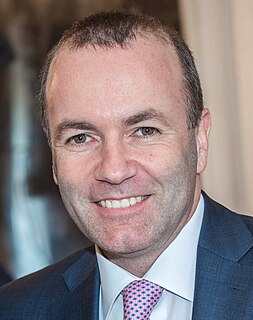
Manfred Weber is a German politician who has served as Leader of the European People's Party in the European Parliament since 2014. He has been a Member of the European Parliament (MEP) from Germany since 2004. He is a member of the Christian Social Union in Bavaria, part of the European People's Party.

The Movement for European Reform, abbreviated to MER, was a pan-European alliance of national centre-right political parties with conservative, pro-free market and Eurosceptic inclinations. It consisted of the Conservative Party of the United Kingdom and the Civic Democratic Party of the Czech Republic.
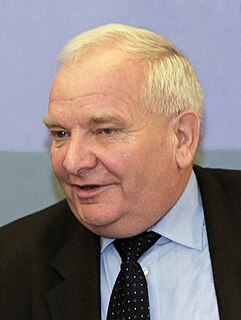
Elections to the European Parliament were held in the 27 member states of the European Union (EU) between 4 and 7 June 2009. A total of 736 Members of the European Parliament (MEPs) were elected to represent some 500 million Europeans, making these the biggest trans-national elections in history. An additional 18 observers were pre-elected.

The European Parliament election was the United Kingdom's component of the 2009 European Parliament election, the voting for which was held on Thursday 4 June 2009. The election was held concurrently with the 2009 local elections in England. In total, 72 Members of the European Parliament were elected from the United Kingdom using proportional representation.
The European Conservative Group was a Conservative political group in the European Parliament between 1973 and 1979.

Europe of Freedom and Democracy (EFD) was a right-wing Eurosceptic political group in the European Parliament. The group was formed following the 2009 European parliamentary election, mostly composed of elements of the Independence/Democracy (IND/DEM) and Union for a Europe of Nations (UEN) groups that had existed during the 6th European Parliament. The group had a loose relationship with Movement for a Europe of Liberties and Democracy (MELD), a European political party founded in 2011.
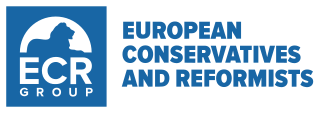
The European Conservatives and Reformists (ECR) is a Eurosceptic, anti-federalist political group of the European Parliament. The ECR is the parliamentary group of the European Conservatives and Reformists Party European political party (formerly known as the Alliance of Conservatives and Reformists in Europe or Alliance of European Conservatives and Reformists, but also includes MEPs from four other European parties and thirteen MEPs without European party affiliation.
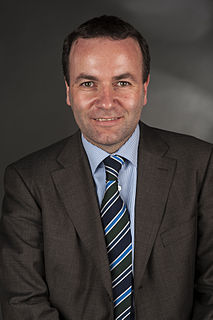
From 22 to 25 May 2014, elections to the European Parliament were held in the European Union.

Edward Hugh Christian McMillan-Scott is a British politician. He was a pro-European Member of the European Parliament (MEP) for Yorkshire and the Humber constituency from 1984 until 2014. He was Leader of then 36 Conservative MEPs 1997–2001 and was elected four times as European Parliament Vice-President between 2004 and 2014. His main portfolio was Human Rights and Democracy.

The Progressive Alliance of Socialists and Democrats (S&D) is the political group in the European Parliament of the Party of European Socialists (PES). The Progressive Alliance of Socialists and Democrats was officially founded as a Socialist Group on 29 June 1953 which makes it the second oldest political group in the European Parliament after the Alliance of Liberals and Democrats for Europe group (ALDE). It adopted its present-day name on 23 June 2009. Centre-left in orientation, the group mostly comprises social-democratic parties and is affiliated with the Progressive Alliance and Socialist International.
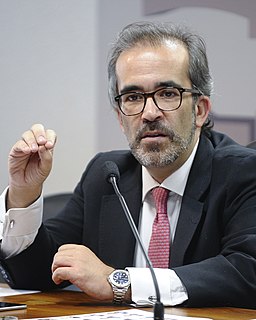
Paulo Artur dos Santos Castro de Campos Rangel is a Portuguese jurist and politician of the Social Democratic Party (PSD) who has been serving as a Member of the European Parliament since 2009. He also serves as vice-president of the European People's Party under the leadership of its president Donald Tusk.

The European Parliament election, 2019 for the election of the delegation from Hungary to the European Parliament was held on 26 May 2019, electing the 21 members of the Hungary delegation to the European Parliament as part of the European elections held across the European Union.
